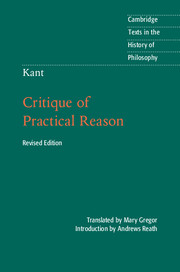Book contents
- Frontmatter
- Contents
- Introduction
- Chronology
- Further reading
- Note on the translation
- Critique of Practical Reason
- Preface
- Introduction On the idea of a critique of practical reason
- The critique of practical reason Part one Doctrine of the elements of pure practical reason
- The critique of practical reason Part two Doctrine of the method of pure practical reason
- Conclusion
- Index
Introduction On the idea of a critique of practical reason
Published online by Cambridge University Press: 05 February 2015
- Frontmatter
- Contents
- Introduction
- Chronology
- Further reading
- Note on the translation
- Critique of Practical Reason
- Preface
- Introduction On the idea of a critique of practical reason
- The critique of practical reason Part one Doctrine of the elements of pure practical reason
- The critique of practical reason Part two Doctrine of the method of pure practical reason
- Conclusion
- Index
Summary
The theoretical use of reason was concerned with objects of the cognitive faculty only, and a critique of it with regard to this use really dealt only with the pure cognitive faculty, since this raised the suspicion, which was afterwards confirmed, that it might easily lose itself beyond its boundaries, among unattainable objects or even among contradictory concepts. It is quite different with the practical use of reason. In this, reason is concerned with the determining grounds of the will, which is a faculty either of producing objects corresponding to representations or of determining itself to effect such objects (whether the physical power is sufficient or not), that is, of determining its causality. For, in that, reason can at least suffice to determine the will and always has objective reality insofar as volition alone is at issue. The first question here, then, is whether pure reason of itself alone suffices to determine the will or whether it can be a determining ground of the will only as empirically conditioned. Now there enters here a concept of causality justified by the Critique of Pure Reason although not capable of being presented empirically, namely that of freedom; and if we can now discover grounds for proving that this property does in fact belong to the human will (and so to the will of all rational beings as well), then it will not only be shown that pure reason can be practical but that it alone, and not reason empirically limited, is unconditionally practical. Consequendy, we shall not have to do a critique of pure practical reason but only of practical reason as such. For, pure reason, 5:16once it is shown to exist, needs no critique. It is pure reason that itself contains the standard for the critical examination of every use of it. It is therefore incumbent upon the Critique of Practical Reason as such to prevent empirically conditioned reason from presuming that it, alone and exclusively, furnishes the determining ground of the will. If it is proved that there is pure reason, its use is alone immanent; the empirically conditioned use, which lays claim to absolute rule is on the contrary transcendent and expresses itself in demands and commands that go quite beyond its sphere – precisely the opposite relation from what could be said of pure reason in its speculative use.
- Type
- Chapter
- Information
- Kant: Critique of Practical Reason , pp. 12 - 14Publisher: Cambridge University PressPrint publication year: 2015

